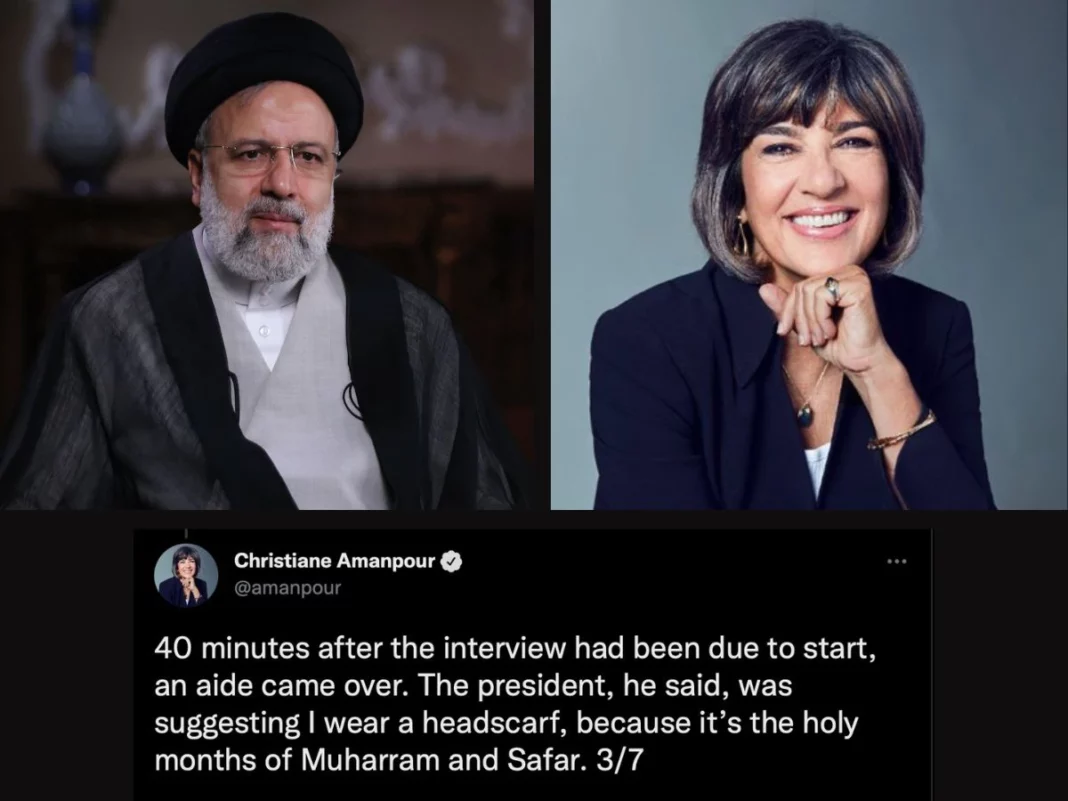Ebrahim Raisi of Iran insisted that Christiane Amanpour to wear a headscarf at their meeting in New York, so she canceled an interview with him.
No previous Iranian president had requested this when Amanpour spoke with them outside of Iran, she said. It was explained to her by a Raisi employee that it was because of “the situation in Iran,” she claims. The death of a woman who had been imprisoned in Iran for allegedly breaking the nation’s headscarf restrictions has resulted in violent unrest. Mahsa Amini, 22, went into a coma last week, just a few hours after the morality police had taken her into custody. According to reports, cops slammed Ms. Amini’s head against a car and bashed her head with a baton. There is no evidence of any abuse, and the authority claim she died of “sudden heart failure.”
The seventh day of the protests has seen 80 additional Islamic Republic cities and villages join in. There have been at least 17 fatalities. Mr. Raisi was scheduled to do his first interview on US soil while he was in attendance at the UN General Assembly. In response to Mr. Raisi’s request, one of the president’s advisers advised that Amanpour cover her hair, despite her assurance that she was ready to conduct the interview. She later posted on Twitter, saying that they were in New York, where there is no custom nor legislation concerning headscarves. According to Amanpour, Mr. Raisi’s assistant made it plain that she would not be granted an interview if she did not don a headscarf, stating that it was “a matter of respect”.

Her team left the interview after rejecting the “unusual and unexpected condition,” as she put it. Later, the US presenter shared a photo of herself standing in front of an empty chair where Mr. Raisi would have sat during their interview without a headscarf. After being elected the previous year, Mr. Raisi issued a decree in August to put the new limits into effect. These included the installation of security cameras to watch over and fine women who were not wearing clothing or to refer them for “counseling,” as well as the imposition of a mandatory prison sentence for any Iranian who questioned or published content online that violated the hijab (headscarf) rules. The limits increased arrests but also a spike in women uploading images and videos of themselves on social media sans headscarves, which has only gotten worse in the days since Ms. Amini’s passing.

When speaking with high officials about headscarves, women journalists are asked this question. We have been required to comply when working in Iran, where coverage is required. Iranian authorities have previously acknowledged that the rule does not apply outside of their country.
Job seeking Hijabi Women Encounter Prejudice in Germany, Spain, Netherlands: Research
However, it must have been deemed too politically perilous to show an exposed female reporter, particularly one of Iranian origin, asking an ultra-conservative president on a topic that is currently a hot-button domestic issue. Afghanistan under Taliban rule exhibits a similar sensitivity. Even top Taliban have warned us that pictures of them seated next to a female journalist are not allowed. Some, though, are less rigid. Most of us are typically motivated by what produces the finest interviews. There must be a balance between respect and refusal to follow orders. But it’s a different matter when the interview is about head coverings.


